Service Quality Essay: Globalisation, Gastronomy, and Cultural Impact
VerifiedAdded on 2023/01/13
|7
|1928
|22
Essay
AI Summary
This essay critically examines the effects of globalization, emphasizing the key aspects of homogenization and heterogenization on food and beverage consumption, and its impact on cultural identity. It also discusses the significance of gastronomy in festivals and events, highlighting its role in shaping cultural definitions, influencing tourism, and enhancing marketing efforts. The essay provides insights into how globalization influences food consumption patterns, cultural identity, and the importance of gastronomy in creating memorable experiences and driving tourism. It explores the interplay between food, culture, and economic factors, providing a comprehensive understanding of the subject matter.

Service Quality
1
1
Paraphrase This Document
Need a fresh take? Get an instant paraphrase of this document with our AI Paraphraser
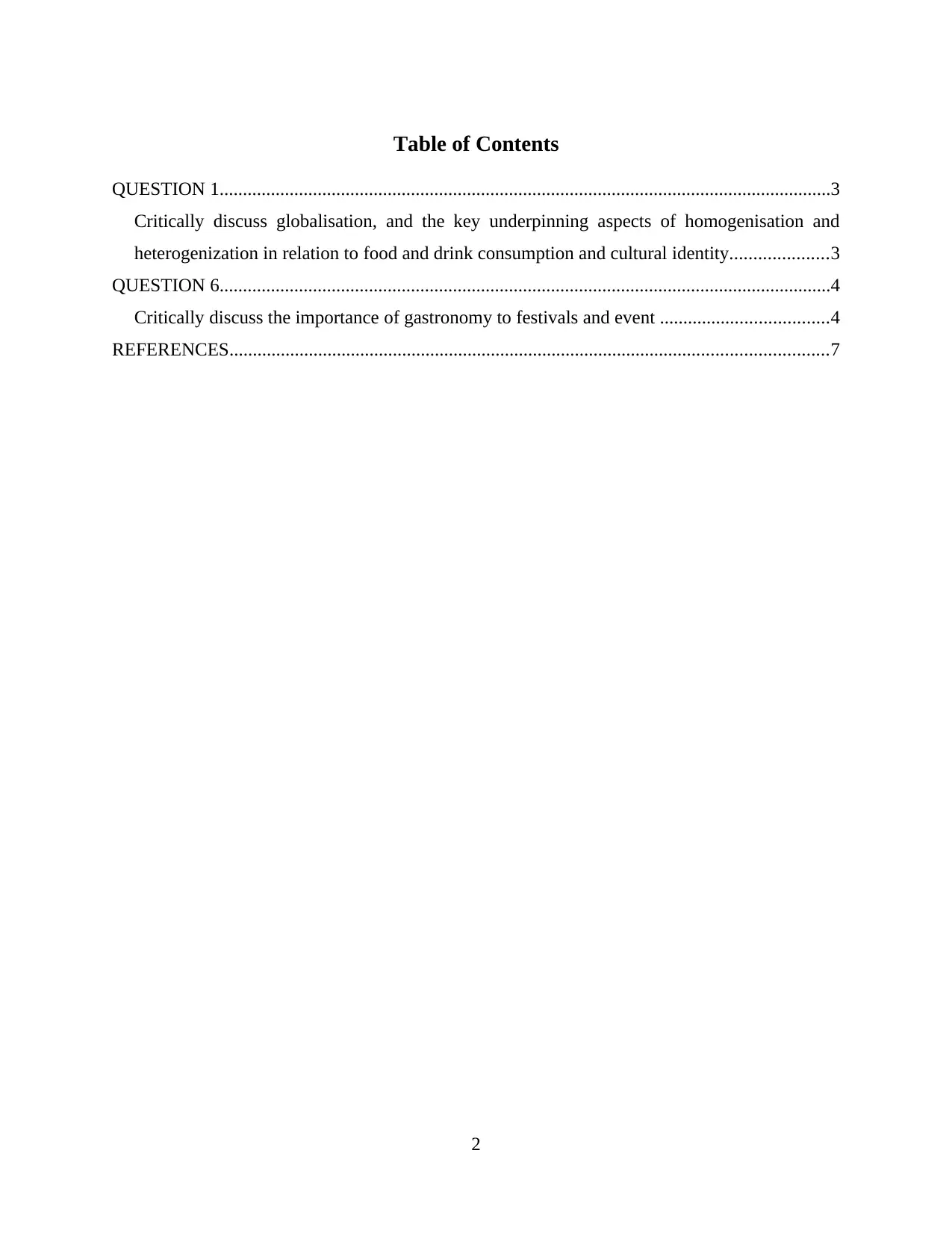
Table of Contents
QUESTION 1...................................................................................................................................3
Critically discuss globalisation, and the key underpinning aspects of homogenisation and
heterogenization in relation to food and drink consumption and cultural identity.....................3
QUESTION 6...................................................................................................................................4
Critically discuss the importance of gastronomy to festivals and event ....................................4
REFERENCES................................................................................................................................7
2
QUESTION 1...................................................................................................................................3
Critically discuss globalisation, and the key underpinning aspects of homogenisation and
heterogenization in relation to food and drink consumption and cultural identity.....................3
QUESTION 6...................................................................................................................................4
Critically discuss the importance of gastronomy to festivals and event ....................................4
REFERENCES................................................................................................................................7
2
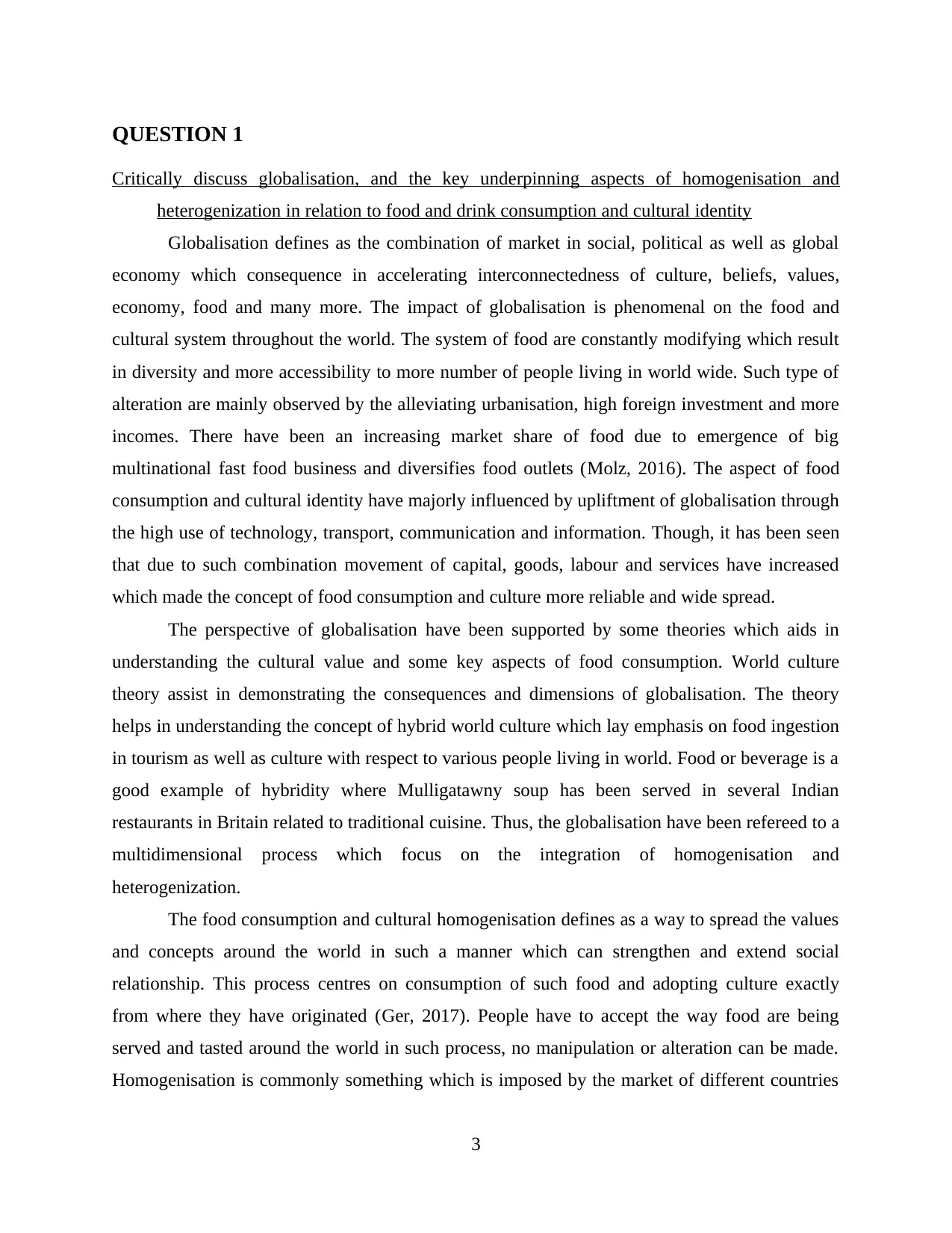
QUESTION 1
Critically discuss globalisation, and the key underpinning aspects of homogenisation and
heterogenization in relation to food and drink consumption and cultural identity
Globalisation defines as the combination of market in social, political as well as global
economy which consequence in accelerating interconnectedness of culture, beliefs, values,
economy, food and many more. The impact of globalisation is phenomenal on the food and
cultural system throughout the world. The system of food are constantly modifying which result
in diversity and more accessibility to more number of people living in world wide. Such type of
alteration are mainly observed by the alleviating urbanisation, high foreign investment and more
incomes. There have been an increasing market share of food due to emergence of big
multinational fast food business and diversifies food outlets (Molz, 2016). The aspect of food
consumption and cultural identity have majorly influenced by upliftment of globalisation through
the high use of technology, transport, communication and information. Though, it has been seen
that due to such combination movement of capital, goods, labour and services have increased
which made the concept of food consumption and culture more reliable and wide spread.
The perspective of globalisation have been supported by some theories which aids in
understanding the cultural value and some key aspects of food consumption. World culture
theory assist in demonstrating the consequences and dimensions of globalisation. The theory
helps in understanding the concept of hybrid world culture which lay emphasis on food ingestion
in tourism as well as culture with respect to various people living in world. Food or beverage is a
good example of hybridity where Mulligatawny soup has been served in several Indian
restaurants in Britain related to traditional cuisine. Thus, the globalisation have been refereed to a
multidimensional process which focus on the integration of homogenisation and
heterogenization.
The food consumption and cultural homogenisation defines as a way to spread the values
and concepts around the world in such a manner which can strengthen and extend social
relationship. This process centres on consumption of such food and adopting culture exactly
from where they have originated (Ger, 2017). People have to accept the way food are being
served and tasted around the world in such process, no manipulation or alteration can be made.
Homogenisation is commonly something which is imposed by the market of different countries
3
Critically discuss globalisation, and the key underpinning aspects of homogenisation and
heterogenization in relation to food and drink consumption and cultural identity
Globalisation defines as the combination of market in social, political as well as global
economy which consequence in accelerating interconnectedness of culture, beliefs, values,
economy, food and many more. The impact of globalisation is phenomenal on the food and
cultural system throughout the world. The system of food are constantly modifying which result
in diversity and more accessibility to more number of people living in world wide. Such type of
alteration are mainly observed by the alleviating urbanisation, high foreign investment and more
incomes. There have been an increasing market share of food due to emergence of big
multinational fast food business and diversifies food outlets (Molz, 2016). The aspect of food
consumption and cultural identity have majorly influenced by upliftment of globalisation through
the high use of technology, transport, communication and information. Though, it has been seen
that due to such combination movement of capital, goods, labour and services have increased
which made the concept of food consumption and culture more reliable and wide spread.
The perspective of globalisation have been supported by some theories which aids in
understanding the cultural value and some key aspects of food consumption. World culture
theory assist in demonstrating the consequences and dimensions of globalisation. The theory
helps in understanding the concept of hybrid world culture which lay emphasis on food ingestion
in tourism as well as culture with respect to various people living in world. Food or beverage is a
good example of hybridity where Mulligatawny soup has been served in several Indian
restaurants in Britain related to traditional cuisine. Thus, the globalisation have been refereed to a
multidimensional process which focus on the integration of homogenisation and
heterogenization.
The food consumption and cultural homogenisation defines as a way to spread the values
and concepts around the world in such a manner which can strengthen and extend social
relationship. This process centres on consumption of such food and adopting culture exactly
from where they have originated (Ger, 2017). People have to accept the way food are being
served and tasted around the world in such process, no manipulation or alteration can be made.
Homogenisation is commonly something which is imposed by the market of different countries
3
⊘ This is a preview!⊘
Do you want full access?
Subscribe today to unlock all pages.

Trusted by 1+ million students worldwide
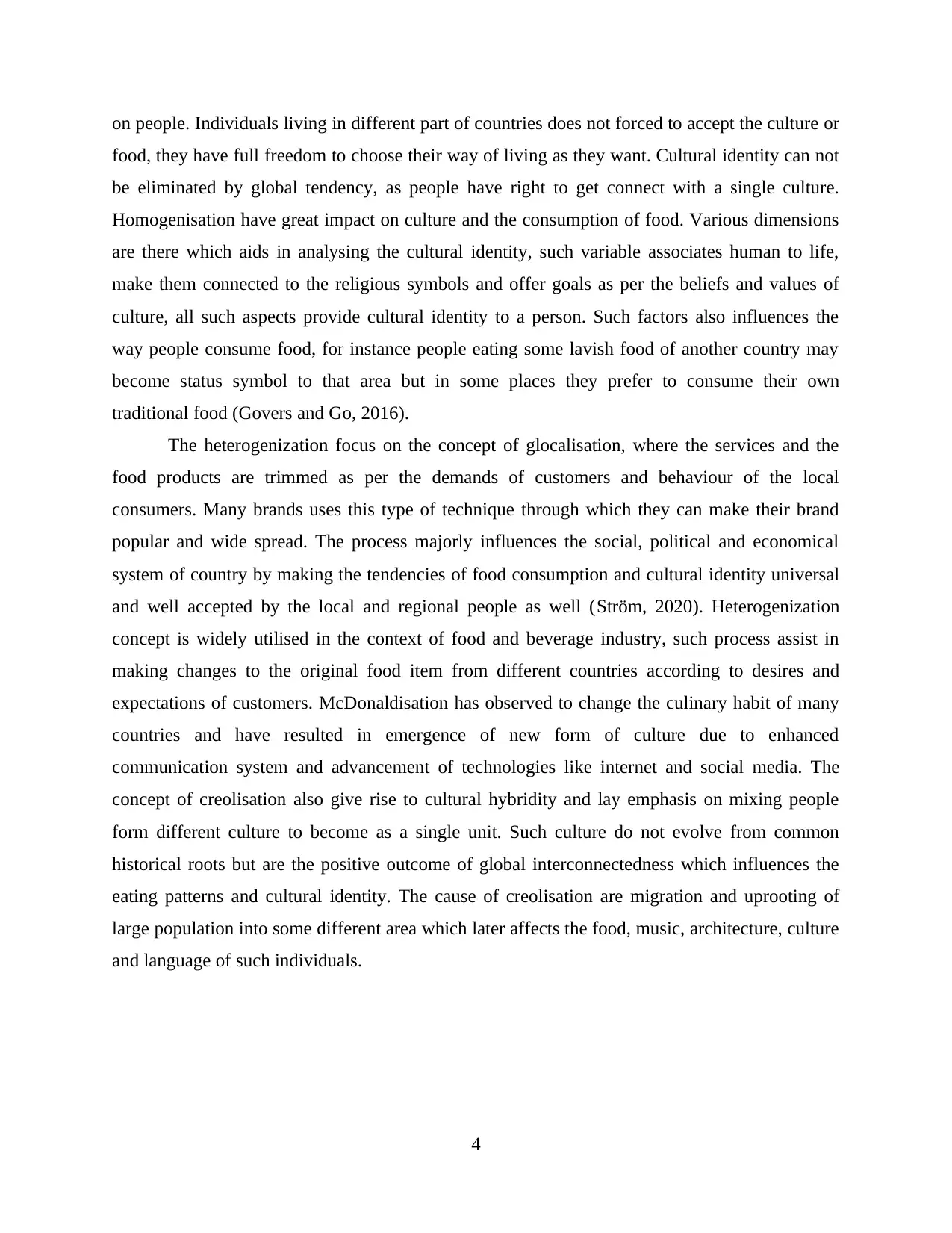
on people. Individuals living in different part of countries does not forced to accept the culture or
food, they have full freedom to choose their way of living as they want. Cultural identity can not
be eliminated by global tendency, as people have right to get connect with a single culture.
Homogenisation have great impact on culture and the consumption of food. Various dimensions
are there which aids in analysing the cultural identity, such variable associates human to life,
make them connected to the religious symbols and offer goals as per the beliefs and values of
culture, all such aspects provide cultural identity to a person. Such factors also influences the
way people consume food, for instance people eating some lavish food of another country may
become status symbol to that area but in some places they prefer to consume their own
traditional food (Govers and Go, 2016).
The heterogenization focus on the concept of glocalisation, where the services and the
food products are trimmed as per the demands of customers and behaviour of the local
consumers. Many brands uses this type of technique through which they can make their brand
popular and wide spread. The process majorly influences the social, political and economical
system of country by making the tendencies of food consumption and cultural identity universal
and well accepted by the local and regional people as well (Ström, 2020). Heterogenization
concept is widely utilised in the context of food and beverage industry, such process assist in
making changes to the original food item from different countries according to desires and
expectations of customers. McDonaldisation has observed to change the culinary habit of many
countries and have resulted in emergence of new form of culture due to enhanced
communication system and advancement of technologies like internet and social media. The
concept of creolisation also give rise to cultural hybridity and lay emphasis on mixing people
form different culture to become as a single unit. Such culture do not evolve from common
historical roots but are the positive outcome of global interconnectedness which influences the
eating patterns and cultural identity. The cause of creolisation are migration and uprooting of
large population into some different area which later affects the food, music, architecture, culture
and language of such individuals.
4
food, they have full freedom to choose their way of living as they want. Cultural identity can not
be eliminated by global tendency, as people have right to get connect with a single culture.
Homogenisation have great impact on culture and the consumption of food. Various dimensions
are there which aids in analysing the cultural identity, such variable associates human to life,
make them connected to the religious symbols and offer goals as per the beliefs and values of
culture, all such aspects provide cultural identity to a person. Such factors also influences the
way people consume food, for instance people eating some lavish food of another country may
become status symbol to that area but in some places they prefer to consume their own
traditional food (Govers and Go, 2016).
The heterogenization focus on the concept of glocalisation, where the services and the
food products are trimmed as per the demands of customers and behaviour of the local
consumers. Many brands uses this type of technique through which they can make their brand
popular and wide spread. The process majorly influences the social, political and economical
system of country by making the tendencies of food consumption and cultural identity universal
and well accepted by the local and regional people as well (Ström, 2020). Heterogenization
concept is widely utilised in the context of food and beverage industry, such process assist in
making changes to the original food item from different countries according to desires and
expectations of customers. McDonaldisation has observed to change the culinary habit of many
countries and have resulted in emergence of new form of culture due to enhanced
communication system and advancement of technologies like internet and social media. The
concept of creolisation also give rise to cultural hybridity and lay emphasis on mixing people
form different culture to become as a single unit. Such culture do not evolve from common
historical roots but are the positive outcome of global interconnectedness which influences the
eating patterns and cultural identity. The cause of creolisation are migration and uprooting of
large population into some different area which later affects the food, music, architecture, culture
and language of such individuals.
4
Paraphrase This Document
Need a fresh take? Get an instant paraphrase of this document with our AI Paraphraser
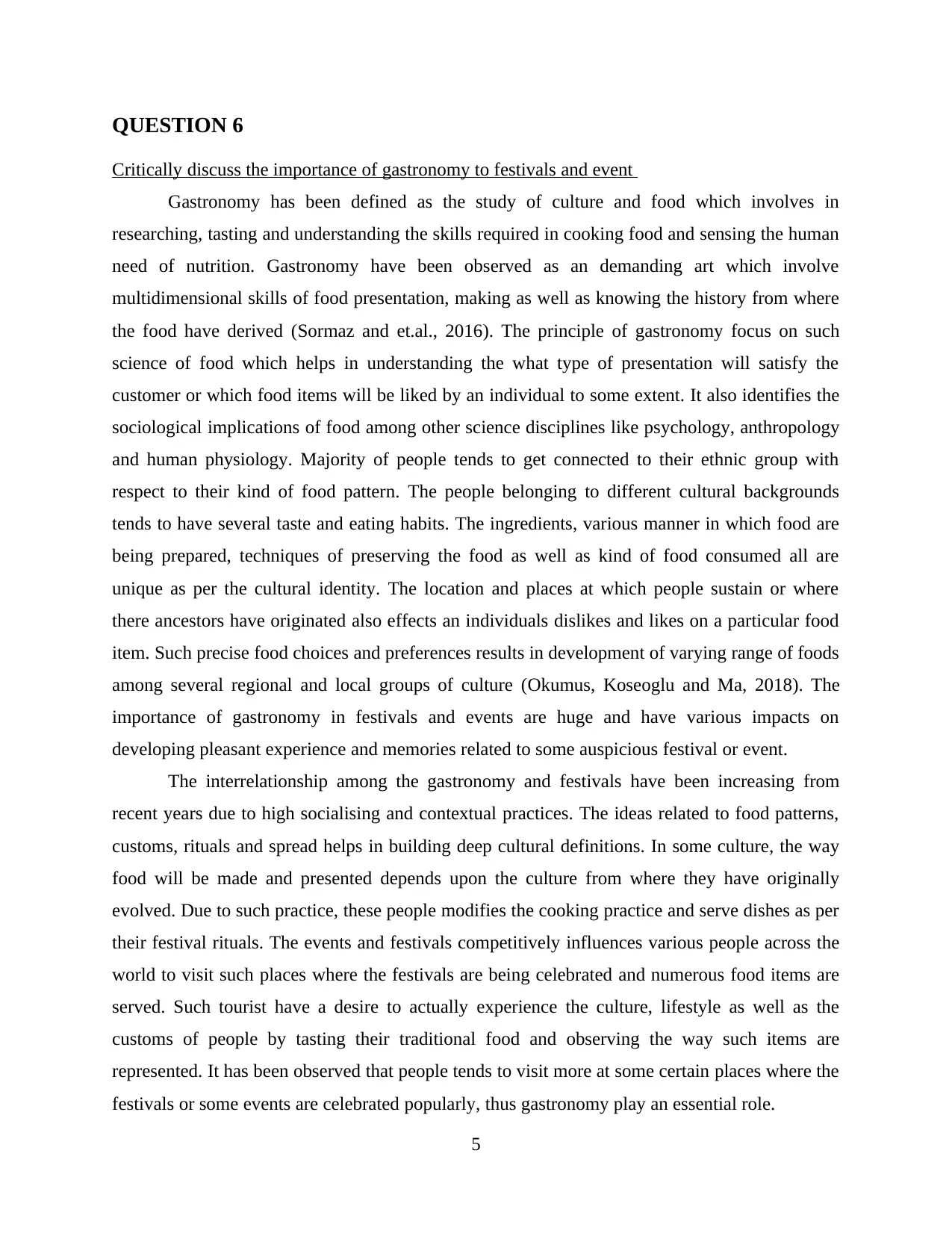
QUESTION 6
Critically discuss the importance of gastronomy to festivals and event
Gastronomy has been defined as the study of culture and food which involves in
researching, tasting and understanding the skills required in cooking food and sensing the human
need of nutrition. Gastronomy have been observed as an demanding art which involve
multidimensional skills of food presentation, making as well as knowing the history from where
the food have derived (Sormaz and et.al., 2016). The principle of gastronomy focus on such
science of food which helps in understanding the what type of presentation will satisfy the
customer or which food items will be liked by an individual to some extent. It also identifies the
sociological implications of food among other science disciplines like psychology, anthropology
and human physiology. Majority of people tends to get connected to their ethnic group with
respect to their kind of food pattern. The people belonging to different cultural backgrounds
tends to have several taste and eating habits. The ingredients, various manner in which food are
being prepared, techniques of preserving the food as well as kind of food consumed all are
unique as per the cultural identity. The location and places at which people sustain or where
there ancestors have originated also effects an individuals dislikes and likes on a particular food
item. Such precise food choices and preferences results in development of varying range of foods
among several regional and local groups of culture (Okumus, Koseoglu and Ma, 2018). The
importance of gastronomy in festivals and events are huge and have various impacts on
developing pleasant experience and memories related to some auspicious festival or event.
The interrelationship among the gastronomy and festivals have been increasing from
recent years due to high socialising and contextual practices. The ideas related to food patterns,
customs, rituals and spread helps in building deep cultural definitions. In some culture, the way
food will be made and presented depends upon the culture from where they have originally
evolved. Due to such practice, these people modifies the cooking practice and serve dishes as per
their festival rituals. The events and festivals competitively influences various people across the
world to visit such places where the festivals are being celebrated and numerous food items are
served. Such tourist have a desire to actually experience the culture, lifestyle as well as the
customs of people by tasting their traditional food and observing the way such items are
represented. It has been observed that people tends to visit more at some certain places where the
festivals or some events are celebrated popularly, thus gastronomy play an essential role.
5
Critically discuss the importance of gastronomy to festivals and event
Gastronomy has been defined as the study of culture and food which involves in
researching, tasting and understanding the skills required in cooking food and sensing the human
need of nutrition. Gastronomy have been observed as an demanding art which involve
multidimensional skills of food presentation, making as well as knowing the history from where
the food have derived (Sormaz and et.al., 2016). The principle of gastronomy focus on such
science of food which helps in understanding the what type of presentation will satisfy the
customer or which food items will be liked by an individual to some extent. It also identifies the
sociological implications of food among other science disciplines like psychology, anthropology
and human physiology. Majority of people tends to get connected to their ethnic group with
respect to their kind of food pattern. The people belonging to different cultural backgrounds
tends to have several taste and eating habits. The ingredients, various manner in which food are
being prepared, techniques of preserving the food as well as kind of food consumed all are
unique as per the cultural identity. The location and places at which people sustain or where
there ancestors have originated also effects an individuals dislikes and likes on a particular food
item. Such precise food choices and preferences results in development of varying range of foods
among several regional and local groups of culture (Okumus, Koseoglu and Ma, 2018). The
importance of gastronomy in festivals and events are huge and have various impacts on
developing pleasant experience and memories related to some auspicious festival or event.
The interrelationship among the gastronomy and festivals have been increasing from
recent years due to high socialising and contextual practices. The ideas related to food patterns,
customs, rituals and spread helps in building deep cultural definitions. In some culture, the way
food will be made and presented depends upon the culture from where they have originally
evolved. Due to such practice, these people modifies the cooking practice and serve dishes as per
their festival rituals. The events and festivals competitively influences various people across the
world to visit such places where the festivals are being celebrated and numerous food items are
served. Such tourist have a desire to actually experience the culture, lifestyle as well as the
customs of people by tasting their traditional food and observing the way such items are
represented. It has been observed that people tends to visit more at some certain places where the
festivals or some events are celebrated popularly, thus gastronomy play an essential role.
5
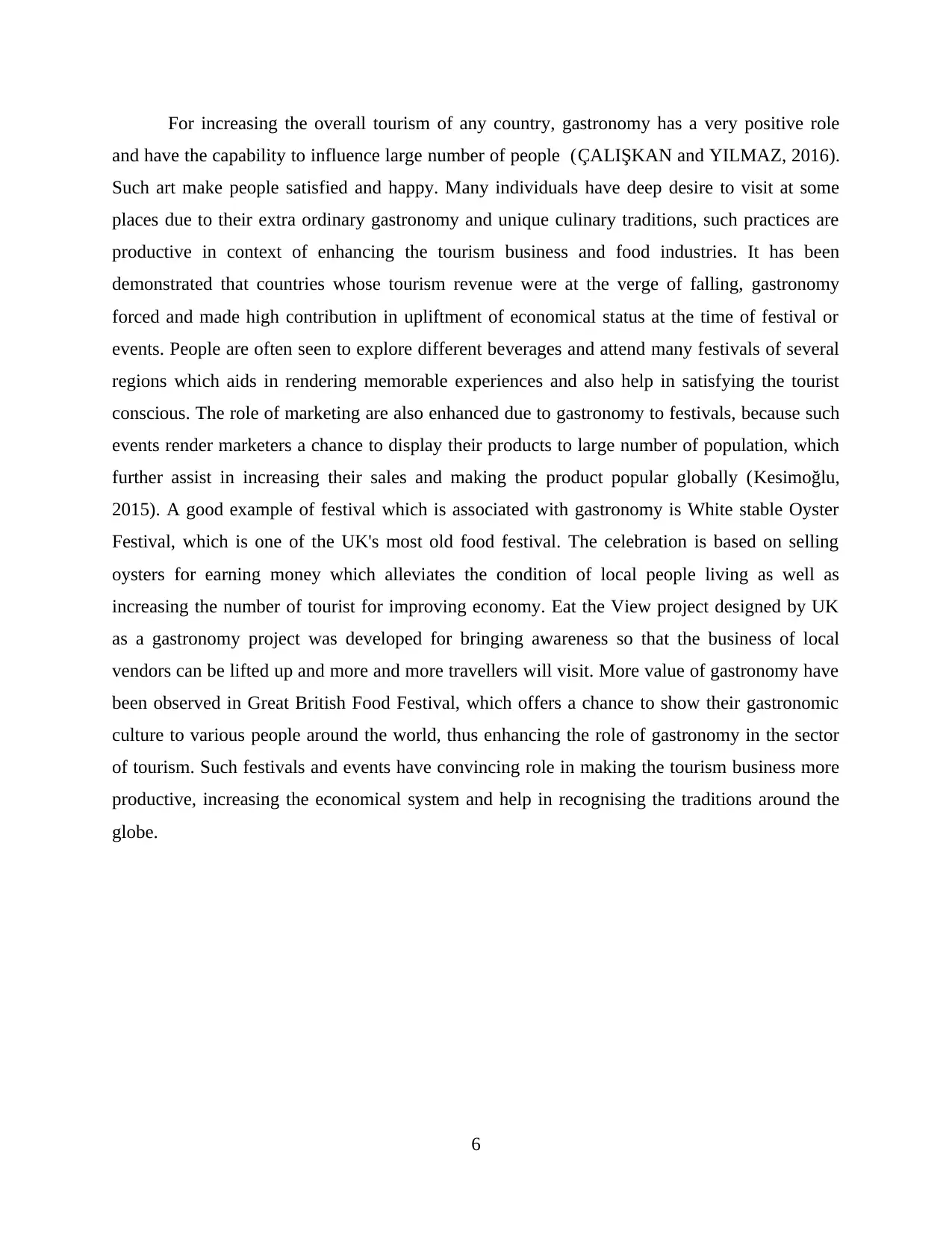
For increasing the overall tourism of any country, gastronomy has a very positive role
and have the capability to influence large number of people (ÇALIŞKAN and YILMAZ, 2016).
Such art make people satisfied and happy. Many individuals have deep desire to visit at some
places due to their extra ordinary gastronomy and unique culinary traditions, such practices are
productive in context of enhancing the tourism business and food industries. It has been
demonstrated that countries whose tourism revenue were at the verge of falling, gastronomy
forced and made high contribution in upliftment of economical status at the time of festival or
events. People are often seen to explore different beverages and attend many festivals of several
regions which aids in rendering memorable experiences and also help in satisfying the tourist
conscious. The role of marketing are also enhanced due to gastronomy to festivals, because such
events render marketers a chance to display their products to large number of population, which
further assist in increasing their sales and making the product popular globally (Kesimoğlu,
2015). A good example of festival which is associated with gastronomy is White stable Oyster
Festival, which is one of the UK's most old food festival. The celebration is based on selling
oysters for earning money which alleviates the condition of local people living as well as
increasing the number of tourist for improving economy. Eat the View project designed by UK
as a gastronomy project was developed for bringing awareness so that the business of local
vendors can be lifted up and more and more travellers will visit. More value of gastronomy have
been observed in Great British Food Festival, which offers a chance to show their gastronomic
culture to various people around the world, thus enhancing the role of gastronomy in the sector
of tourism. Such festivals and events have convincing role in making the tourism business more
productive, increasing the economical system and help in recognising the traditions around the
globe.
6
and have the capability to influence large number of people (ÇALIŞKAN and YILMAZ, 2016).
Such art make people satisfied and happy. Many individuals have deep desire to visit at some
places due to their extra ordinary gastronomy and unique culinary traditions, such practices are
productive in context of enhancing the tourism business and food industries. It has been
demonstrated that countries whose tourism revenue were at the verge of falling, gastronomy
forced and made high contribution in upliftment of economical status at the time of festival or
events. People are often seen to explore different beverages and attend many festivals of several
regions which aids in rendering memorable experiences and also help in satisfying the tourist
conscious. The role of marketing are also enhanced due to gastronomy to festivals, because such
events render marketers a chance to display their products to large number of population, which
further assist in increasing their sales and making the product popular globally (Kesimoğlu,
2015). A good example of festival which is associated with gastronomy is White stable Oyster
Festival, which is one of the UK's most old food festival. The celebration is based on selling
oysters for earning money which alleviates the condition of local people living as well as
increasing the number of tourist for improving economy. Eat the View project designed by UK
as a gastronomy project was developed for bringing awareness so that the business of local
vendors can be lifted up and more and more travellers will visit. More value of gastronomy have
been observed in Great British Food Festival, which offers a chance to show their gastronomic
culture to various people around the world, thus enhancing the role of gastronomy in the sector
of tourism. Such festivals and events have convincing role in making the tourism business more
productive, increasing the economical system and help in recognising the traditions around the
globe.
6
⊘ This is a preview!⊘
Do you want full access?
Subscribe today to unlock all pages.

Trusted by 1+ million students worldwide
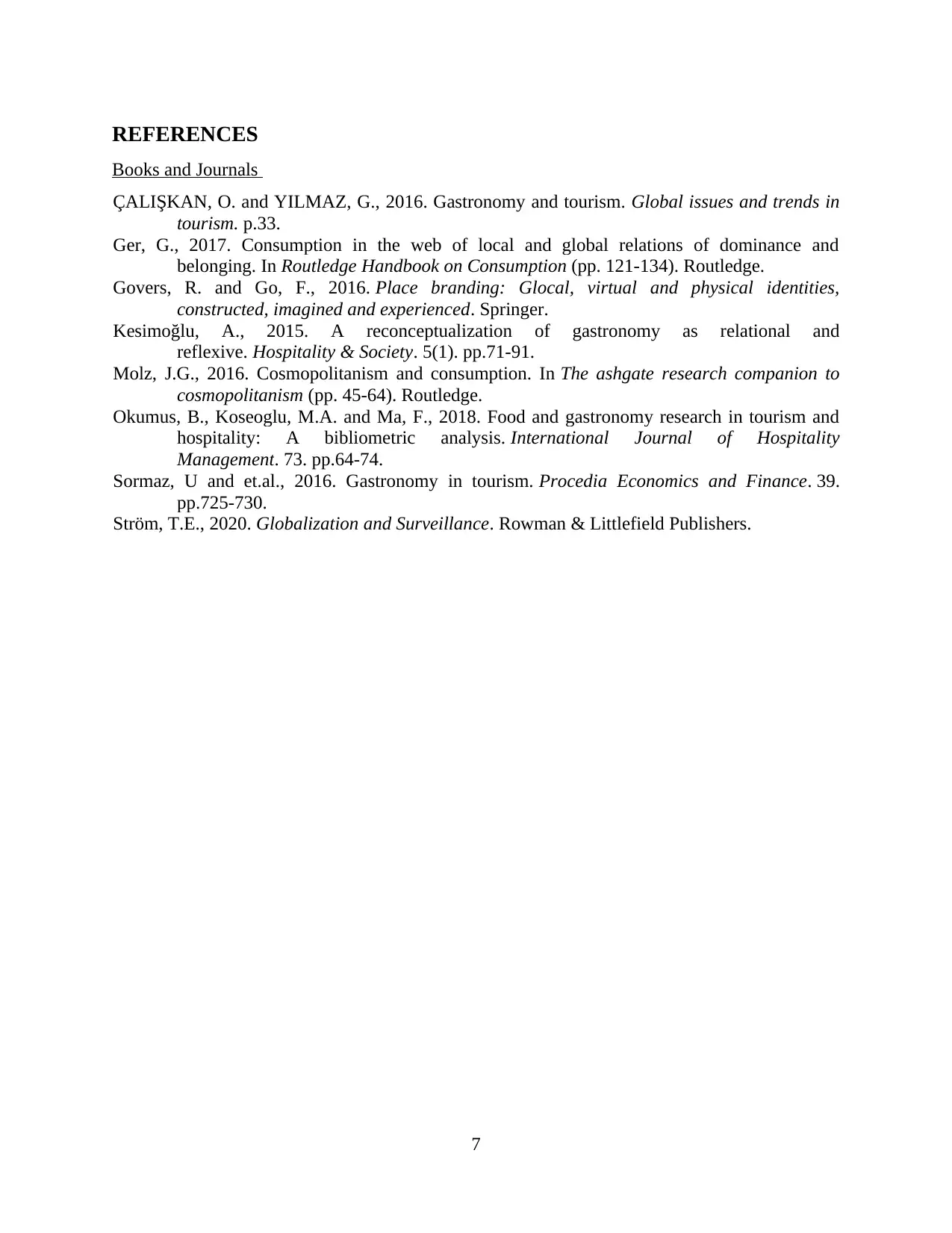
REFERENCES
Books and Journals
ÇALIŞKAN, O. and YILMAZ, G., 2016. Gastronomy and tourism. Global issues and trends in
tourism. p.33.
Ger, G., 2017. Consumption in the web of local and global relations of dominance and
belonging. In Routledge Handbook on Consumption (pp. 121-134). Routledge.
Govers, R. and Go, F., 2016. Place branding: Glocal, virtual and physical identities,
constructed, imagined and experienced. Springer.
Kesimoğlu, A., 2015. A reconceptualization of gastronomy as relational and
reflexive. Hospitality & Society. 5(1). pp.71-91.
Molz, J.G., 2016. Cosmopolitanism and consumption. In The ashgate research companion to
cosmopolitanism (pp. 45-64). Routledge.
Okumus, B., Koseoglu, M.A. and Ma, F., 2018. Food and gastronomy research in tourism and
hospitality: A bibliometric analysis. International Journal of Hospitality
Management. 73. pp.64-74.
Sormaz, U and et.al., 2016. Gastronomy in tourism. Procedia Economics and Finance. 39.
pp.725-730.
Ström, T.E., 2020. Globalization and Surveillance. Rowman & Littlefield Publishers.
7
Books and Journals
ÇALIŞKAN, O. and YILMAZ, G., 2016. Gastronomy and tourism. Global issues and trends in
tourism. p.33.
Ger, G., 2017. Consumption in the web of local and global relations of dominance and
belonging. In Routledge Handbook on Consumption (pp. 121-134). Routledge.
Govers, R. and Go, F., 2016. Place branding: Glocal, virtual and physical identities,
constructed, imagined and experienced. Springer.
Kesimoğlu, A., 2015. A reconceptualization of gastronomy as relational and
reflexive. Hospitality & Society. 5(1). pp.71-91.
Molz, J.G., 2016. Cosmopolitanism and consumption. In The ashgate research companion to
cosmopolitanism (pp. 45-64). Routledge.
Okumus, B., Koseoglu, M.A. and Ma, F., 2018. Food and gastronomy research in tourism and
hospitality: A bibliometric analysis. International Journal of Hospitality
Management. 73. pp.64-74.
Sormaz, U and et.al., 2016. Gastronomy in tourism. Procedia Economics and Finance. 39.
pp.725-730.
Ström, T.E., 2020. Globalization and Surveillance. Rowman & Littlefield Publishers.
7
1 out of 7
Related Documents
Your All-in-One AI-Powered Toolkit for Academic Success.
+13062052269
info@desklib.com
Available 24*7 on WhatsApp / Email
![[object Object]](/_next/static/media/star-bottom.7253800d.svg)
Unlock your academic potential
Copyright © 2020–2026 A2Z Services. All Rights Reserved. Developed and managed by ZUCOL.




